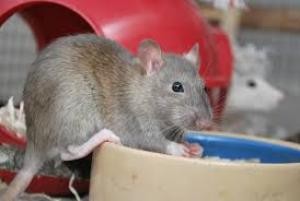Pet rats, with their বুদ্ধিদীপ্ত eyes and playful personalities, make wonderful companions. As omnivores, they enjoy a diverse diet, which can sometimes lead owners to wonder about the safety of certain human foods. If you’re a rat parent, you’ve likely pondered, “Can Pet Rats Have Tomatoes?” The short answer is yes, but there’s more to it than a simple yes or no. Let’s delve into the details of feeding tomatoes to your pet rats, ensuring they enjoy this fruit safely and healthily.
Are Tomatoes Safe for Pet Rats? Understanding the Basics
Ripe tomatoes, in moderation, are generally safe and even beneficial for pet rats. They are packed with vitamins and antioxidants that can contribute to your rat’s overall health. Tomatoes contain vitamin C, vitamin K, potassium, and beta-carotene, nutrients that support immune function, bone health, and vision. However, it’s crucial to understand which parts of the tomato are safe and how to offer them to your furry friends.
The key to safely feeding tomatoes lies in understanding the different components of the fruit. The ripe, red fleshy part of a tomato is usually safe. However, the green parts of the tomato plant, including the leaves, stems, and unripe green tomatoes, contain a compound called solanine. Solanine is toxic to rats and can cause digestive issues and other health problems if ingested in significant amounts.
The Benefits of Tomatoes for Pet Rats
When given in the right way, tomatoes can be a healthy treat for your pet rats. Here are some potential benefits:
- Source of Vitamins: Tomatoes are a good source of Vitamin C and Vitamin K. Vitamin C is an antioxidant that boosts the immune system, while Vitamin K is essential for blood clotting and bone health.
- Antioxidants: The vibrant red color of tomatoes comes from lycopene, a powerful antioxidant. Antioxidants help protect cells from damage and can contribute to overall health and longevity.
- Hydration: Tomatoes have high water content, which can contribute to your rat’s hydration, especially during warmer months.
- Variety in Diet: Introducing small amounts of safe fruits like tomatoes can add variety to your rat’s diet, making meal times more interesting and enriching.
Potential Risks of Feeding Tomatoes to Rats
While ripe tomatoes offer benefits, it’s important to be aware of the potential risks:
- Acidity: Tomatoes are acidic, and too much acidity can upset your rat’s digestive system, potentially leading to diarrhea or stomach discomfort. Therefore, moderation is key.
- Solanine Poisoning: As mentioned earlier, solanine is present in green parts of the tomato. Ingesting leaves, stems, or unripe green tomatoes can lead to solanine poisoning, causing symptoms like lethargy, loss of appetite, diarrhea, and tremors. Always ensure you are only offering the ripe, red fruit and have removed any green parts.
- Pesticides: Commercially grown tomatoes may contain pesticides. Always wash tomatoes thoroughly before offering them to your rats to minimize pesticide exposure. Opting for organic tomatoes can further reduce this risk.
How to Safely Feed Tomatoes to Your Pet Rat
To safely incorporate tomatoes into your pet rat’s diet, follow these guidelines:
- Choose Ripe Tomatoes: Only offer fully ripe, red tomatoes. Avoid green or unripe tomatoes entirely.
- Wash Thoroughly: Wash the tomato thoroughly under running water to remove any potential pesticide residue or dirt.
- Remove Green Parts: Carefully remove the stem, leaves, and any green parts attached to the tomato.
- Cut into Small Pieces: Cut the ripe tomato into small, bite-sized pieces that are easy for your rat to handle and eat, minimizing the risk of choking.
- Serve in Moderation: Tomatoes should be given as an occasional treat, not as a staple food. A small piece of tomato once or twice a week is sufficient. Think of it as a supplement to their balanced diet, not a replacement.
- Observe Your Rat: After introducing tomatoes for the first time, observe your rat for any signs of digestive upset, such as diarrhea or lethargy. If you notice any adverse reactions, discontinue feeding tomatoes and consult with a veterinarian experienced in treating rodents.
What Should Form the Core of Your Rat’s Diet?
While treats like tomatoes can be a welcome addition, a balanced diet is crucial for your pet rat’s health. The foundation of their diet should be a high-quality rodent pellet food.
Pelleted Food: A good quality rat pellet food ensures your rat receives all the necessary vitamins and minerals in the correct proportions. Look for pellets specifically formulated for rodents, with a protein content of around 16% and a fat content of 4-5%. Pellets prevent selective feeding, a common problem with seed mixes where rats pick out their favorite (often less healthy) components. Brands like Vetafarm Rodent Origins are often recommended.
Fruits and Vegetables: Alongside pellets, a variety of safe fruits and vegetables should be offered daily. Besides tomatoes (in moderation), safe options include:
- Fruits: Apples (without seeds), pears, berries (strawberries, blueberries, raspberries), melons, bananas (in moderation due to sugar content).
- Vegetables: Broccoli, carrots, peas, spinach, kale, cucumber, bell peppers (capsicum), green beans, Asian greens.
Treats in Moderation: Treats can be given in small amounts daily but should not exceed 10% of their daily food intake. Healthy treat options include:
- Small amounts of seeds and nuts (unsalted).
- Cooked pasta or rice (plain).
- Whole grain bread or crackers.
- Occasional small pieces of cooked lean meat (chicken or fish, no bones).
Foods to Avoid: Certain foods are harmful or toxic to rats and should be strictly avoided:
- Toxic Foods: Rhubarb, green potatoes and potato peels, raw sweet potato, avocado, blue cheese and moldy cheeses, licorice.
- Choking Hazards: Peanut butter and sticky pastes (can cause choking).
- High Sugar and Processed Foods: Candy, sugary cereals, processed meats (salami, fritz).
- Alcohol and Caffeine: Never give rats alcohol or caffeinated beverages.
Conclusion: Tomatoes Can Be a Rat Treat, Eaten Responsibly
In conclusion, yes, pet rats can have tomatoes, and they can even enjoy them as a healthy and flavorful treat. By offering ripe tomatoes in moderation, properly prepared and as part of a balanced diet, you can safely share this fruit with your furry friend. Always prioritize a diet based on high-quality rodent pellets and a variety of safe fruits and vegetables, and remember to avoid any potentially harmful foods. When in doubt about your rat’s diet, always consult with a veterinarian experienced in rodent care. Happy feeding!

